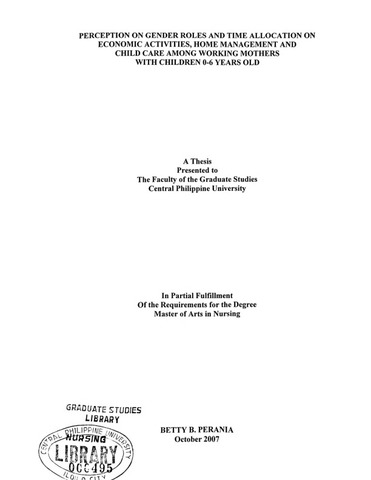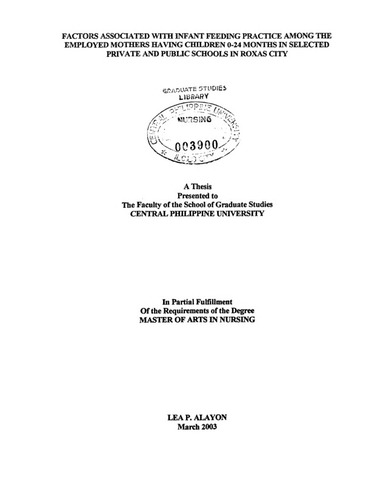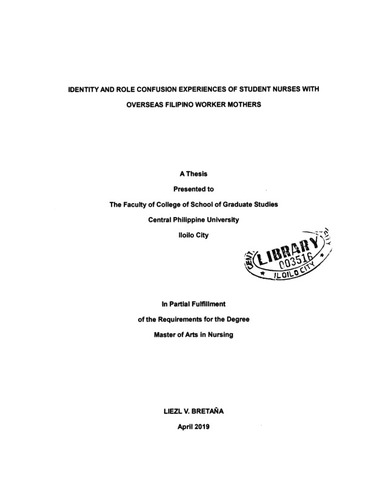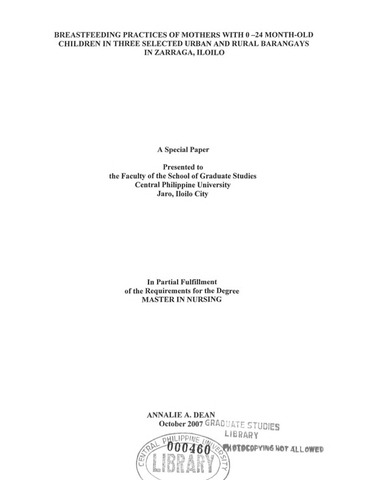| dc.description.abstract | This study aimed to determine mothers’ perception of gender roles and their time allocation in economic activities, home management, and child care. Specifically, this investigation determined the mothers’ characteristics in terms of age, number of children, household size, and family income; their perception of gender roles and their time allocation in economic activities, home management, and child care; the relationship between the selected characteristics and their perception of gender roles; and variation in their time allocation according to their characteristics and perception of gender roles.
This is a descriptive-relational study that used the one-shot survey design. The respondents were 83 female faculty and staff members with zero to six-year old children. A self-administered questionnaire was used as the survey instrument.
The simple recall approach was used to determine time spent by working mothers with zero to six years old children in economic, home management, and child care activities.
Major Findings of the Study
Most of the mothers in this study were between 36 and above years of age and had a family income of Php30,000 and below. The average income was Php30,511.24 a month. Their households had six members and they had an average of two children. The majority of mothers perceived that economic, home management, and child care activities should be a shared responsibility of both the husband and the wife. All of them perceived child care activities such as playing, talking, reading stories and bringing the child to church, school or shopping to be made jointly by both spouses.
It was also noted that the respondents’ number of children was significantly associated with their perception as to whose major role it is to earn a living. Likewise, their household size was also associated with their perception in budgeting and shopping for groceries. On the other hand, age and family income did not influence mothers’ perception on gender roles.
The mothers spent an average of 37.67 hours in economic activities, 19.09 hours in home management and 36.48 hours in child care per week. The highest mean number of hours spent was in meal preparation, followed by housekeeping for household chores, and playing, talking, reading stories in child care activities. The mothers’ time allocation significantly varied according to their perception of gender role in home management specifically in doing the laundry and ironing. Time spent in all other household activities and all of the economic and childcare activities did not vary irrespective of their perception of gender roles.
Furthermore, the time spent by mothers in bathing, dressing, and changing diapers significantly varied according to their perception of gender role in childcare. However, the rest of the activities did not vary according to their perception of gender roles in economic, home management, and child care activities.
Conclusion
The findings show that the number of children is significantly related with the mothers’ perception in earning a living; likewise with household size in budgeting of household expenses and shopping for groceries, marketing, housekeeping and cleaning of surroundings. Whereas, mothers’ age and family income have no significant bearing on their perception of gender roles in all other activities in economic activities, home management and child care. This means that mothers with egalitarian ideology perceive these activities as the conjugal role of both the husband and the wife, but they still perform the traditional roles of a homemaker and child-rearing.
Time spent in home management such as washing dishes and cleaning-up after significantly vary according to the number of children. Mothers with lesser household members spent more mean number of hours on this activities than those with more household members. Whereas, there no variation in the mothers’ time allocation in economic activities, child care and other household tasks when classified according to characteristics. The hypothesis therefore that the time allocation of working mothers in economic activities, home management, and childcare significantly vary when classified according to the number of children, household size, and family income cannot be supported by the results of this study.
Time allocated by the working mothers in child care activities specifically bathing the child, dressing, and changing diapers significantly vary according to their perception of gender roles. Mothers who perceived it as the sole responsibility of the wife spent more mean number of hours on this activity than that of those who perceived it as the role of both the husband and the wife. However, there is no variation in the time allocation in economic activities, housework and other child care activities. This means that the hypothesis that the time allocation of working mothers in economic activities, home management, and childcare significantly vary when classified according to their perception of gender roles cannot be supported by the results of this study.
Furthermore, the results of this study support the gender role theory, which assumes that gender norms influence people’s beliefs about the appropriateness of certain tasks for women and men. A wife’s perception of the fairness of the division of domestic labor or as to whose major responsibility are the gender roles also affect their household and child care participation. Parents with a more egalitarian relationship tend to have more equal level of involvement in children’s lives than those who hold more traditional gender ideology. Women, even those employed full time will continue to work longer hours because they are pressured by the traditional sex roles and attitudes that continue to reinforce the conventional definition of men and women’s work in today’s society; and they will continue to do so until domestic work becomes a paid labour. The theory points that ideological factors will override time constraints, and the wife will continue to do most of the traditionally female domestic labor.
Recommendations
Women are beginning to realize their worth and value as mothers and at the same time pursue careers for their own personal growth.
1. To further raise the level of consciousness of women about their rights, it is recommended that they should be encouraged to attend seminars and lectures on gender roles to increase their knowledge and awareness regarding the value of women’s work and to free themselves from household chores and involve their husbands in some of the functions traditionally assigned to housewives and mothers. This will provide insights into the meaning of gender - division of tasks that are part of domestic intimate life.
2. Men should be supportive of women’s right to pursue their career so that they will make significant contribution to family income. They should attend more seminars that will provide them knowledge and increase their awareness of the gender roles; and more men will share in the traditional roles of women as they begin to recognize that their relationship with their wives is egalitarian and complementary.
3. Revision and improvements should be made in the components of the existing programs and projects on personal and child care services available to fit in the time of the working mothers. Improve the day care centers in every barangay to give care and social learning opportunities to preschool children while their mothers are out earning a living.
4. Employers should make provisions to prohibit discrimination against women with respect to terms and conditions of employment, promotion and training opportunities. This should give way to the formulation of family-oriented legislations to ease the burden in managing time used on family and work responsibilities. A support program can be designed with the help of the management, and other networks so that mothers can maintain both their indispensable competence to the company and their parental concerns. Creating minding centers for preschool children while women employees are at work will ease out the burden among these working mothers.
5. Revision of the government policies to provide them basis to come up with policies that will protect and promote women’s health and to take actions to promote family issues and to build a better child care infrastructures; the government service insurance system to expand the coverage and benefits for working women especially if they have children.
6. Improvement and revisions in the school curriculum should be implemented, especially in the concepts of early childhood development, and women’s health and development program that is focused on gender awareness and the development of gender-sensitive health care services.
7. More studies should be conducted on the division of labor among the dual earner couples to improve family welfare with focus on motherhood and child survival, promote family solidarity and responsible parenthood, and to enhance the parent effectiveness program of the government. This will also provide the private groups with the information regarding women’s concerns, especially on men’s participation in child care and other household responsibilities. Lastly, future researchers should explore new problems related to this topic or they can examine other variables that affect time allocation. | en_US |





